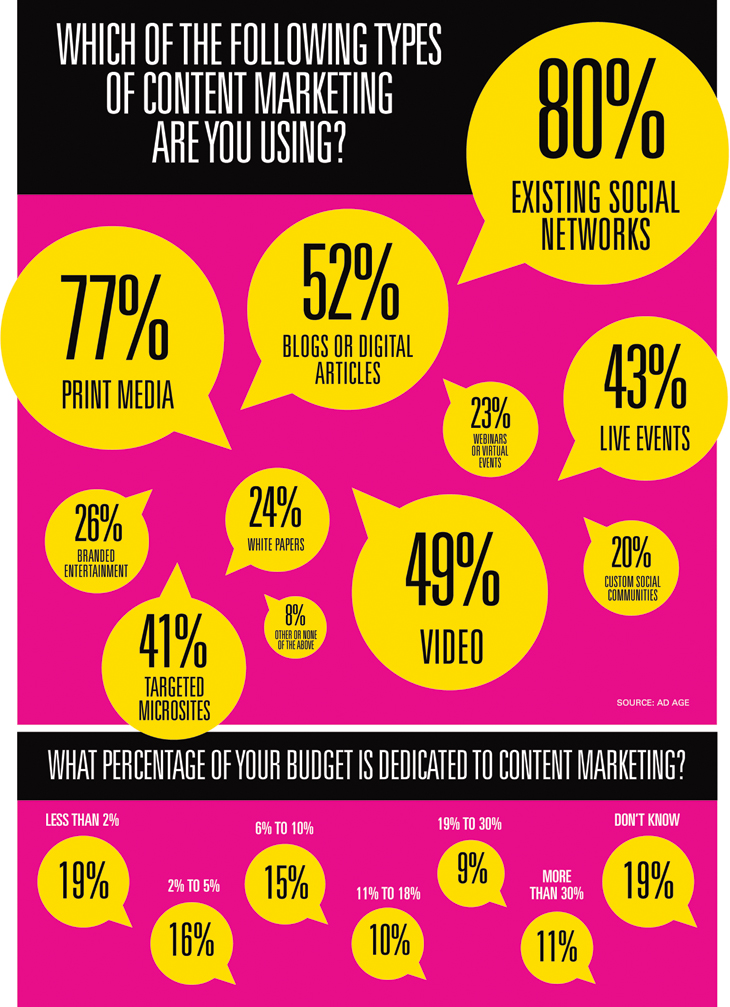Branded content – the packaging of marketing material as editorial or entertainment content – is all the rage these days, although no one’s very angry about it.
From Advertising Age:
Solving the Content Creation Conundrum
More Spending Is Flowing Toward Content Marketing, Yet Many Advertisers Don’t Fully Understand How to Do It or How to Measure it
Content marketing remains the bright, shiny objet du jour for marketers, even as they work to figure out how to best implement it and measure results.
Content marketing is attracting its share of marketers’ budgets — 12% on average — and more than half of marketers plan to spend even more in the coming year, according to a survey Ad Age conducted in late 2012 of nearly 600 marketers. Yet, it’s clear most marketers are struggling with some pretty basic questions: Who should be the “boss” of content? How much should be spent on content marketing? Is it effective?
Maybe they should ask The Atlantic, which is still trying to explain the pimping out of its website to the Church of Scientology last week.
From The New York Observer:
The Atlantic Staff Memo About That Scientology Advertorial
The Atlantic president M. Scott Havens wrote to his staff [last Friday] to assure them that the advertorial kinks were being worked out in the wake of the outcry–and subsequent apology by the magazine–following The Atlantic’s pro-Scientology sponsored content earlier this week.
“It seems fitting to quote one of our founders, Ralph Waldo Emerson, who once said ‘Our greatest glory is not in never failing, but in rising up every time we fail,’” Mr. Havens wrote in the staff memo a tipster sent us this morning. “This isn’t the first, nor the last time that WE will make mistakes, but what is important is how we handle them and what we learn from these moments.”
Full memo at Observer site and here (via The Daily Caller).
Regardless of that slow-motion train wreck, marketers are still super-sizing their content marketing. Helpful chart from Ad Age:
All that investment, and the marketers don’t even know what they’re doing yet.
Just 8% of marketers told Ad Age they are “very satisfied” with their ability to understand the effectiveness of content marketing; 48% say they are “somewhat satisfied.”
“There’s very little ability to attribute lift in business to content-marketing activities,” said one survey taker. “It’s difficult to “test and learn’ this stuff if you want to create something really relevant and engaging. Big leaps are required but difficult to sell in.”
But they’re making progress.
Jeff Jones, CMO at Target . . . pointed to the success of A Bull’s-eye View. The year-old online magazine attracts “well north” of 100,000 unique visitors. “We understand the basic things. … But we don’t have a single metric yet, and we don’t have history to know its predictive nature.
“It’s hard,” said Mr. Jones. “It’s easy to talk about buzzwords but hard to operationalize what this really means. We’re in the early days of a long journey.”
A long journey for marketers. An even more painful one for consumers, if they recognize it.
John R. Carroll is media analyst for NPR's Here & Now and senior news analyst for WBUR in Boston. He also writes at Campaign Outsider and It's Good to Live in a Two-Daily Town.
John R. Carroll has 305 post(s) on Sneak Adtack

1 comment
The Winter Of Our This Content | Campaign Outsider says:
Jan 23, 2013
[…] the rest at Sneak Adtack. Share this:ShareLike this:LikeBe the first to like this. This entry was posted in Uncategorized. […]